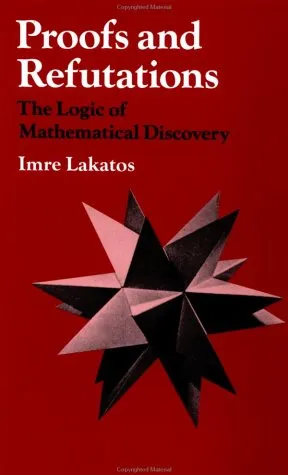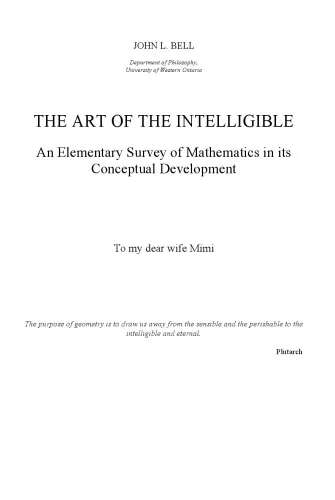Proofs and Refutations: The Logic of Mathematical Discovery
4.5
بر اساس نظر کاربران

شما میتونید سوالاتتون در باره کتاب رو از هوش مصنوعیش بعد از ورود بپرسید
هر دانلود یا پرسش از هوش مصنوعی 2 امتیاز لازم دارد، برای بدست آوردن امتیاز رایگان، به صفحه ی راهنمای امتیازات سر بزنید و یک سری کار ارزشمند انجام بدینکتاب های مرتبط:
معرفی کتاب "Proofs and Refutations: The Logic of Mathematical Discovery"
کتاب "Proofs and Refutations" اثر نویسندگان شهیر ایمِره لاکاتوش، جان وورال و الی زاهار، یکی از آثار برجسته در حوزه فلسفه علم و منطق ریاضیات است. این کتاب به بررسی فرآیند کشف در ریاضیات و نقد روشهای اسکولاستیک و سیستمی کشف حقیقت میپردازد و روشی پویا برای درک بهتر پیشرفت علمی ارائه میدهد.
خلاصهای دقیق از کتاب
کتاب "Proofs and Refutations"، داستان گفتوگویی در فضای یک کلاس درس را بیان میکند که در آن معلم و دانشآموزان به بررسی و نقد نظریات ریاضی و اثباتهای آنها میپردازند. محور اصلی کتاب بر اساس یادداشتهای لاکاتوش از کارگاه آموزشی پیر فرمایر است، جایی که او با استفاده از یک رویکرد تاریخی، فلسفی و انتقادی به بررسی ساختار و ماهیت دانش ریاضی میپردازد.
یکی از نکات اساسی کتاب، نقد روش استقرای است که در آن کشف حقایق تنها از طریق یک روند خطی و ثابت صورت نمیپذیرد، بلکه نیازمند بازنگری و تعدیل پیوسته از طریق تجارب جدید و چالشهای قابل قبول است.
نکات کلیدی
- تلاش برای درک فرآیند کشف در ریاضیات نه فقط به عنوان نتایج نهایی، بلکه به عنوان فرآیندی زنده و پویا.
- نقد بر روشهای سنتی و ایستایی که دستیابی به حقیقت را تنها در چارچوب نظمهای خاص ریاضی تصور میکند.
- تشویق به داشتن رویکردی انتقادی و آزمایشی نسبت به نظرات و نظریات، بهجای پذیرش بیچونوچرا.
- تاکید بر اهمیت مشارکت فعال و نقادانه در فرآیندهای یادگیری و نه فقط پیروی کورکورانه از آموزهها.
نقلقولهای معروف از کتاب
«علم، صرفا مجموعهای از دانشهای نهایی و قطعی نیست بلکه پویاییاش در فرآیند کشف و بازکاوی حقیقت نهفته است.»
«اثباتهای ریاضی نیز مانند سایر نظریات علمی، نیازمند آزمون و تصحیحاند و هرگز گُمرک نیستند.»
چرا این کتاب مهم است؟
کتاب "Proofs and Refutations" پنجرهای نو به سوی فهم چگونگی پیشرفت دانش ریاضی و علمی میگشاید. به جای اینکه ریاضیات را به عنوان یک سیستم ثابت و عاری از چالش ببینیم، لاکاتوش به ما نشان میدهد که فرآیندها و تلاشهای انسانی همانقدر که برای توسعه نظریات ضروری هستند، به همان میزان به پیشرفت و غنای آنها کمک میکنند.
از این جهت، این کتاب نه تنها برای فیلسوفان علم و ریاضیدانان بلکه برای همه افرادی که به دنبال درک بهتر فرآیندهای فکری هستند، جذاب و آموزنده است. این رویکرد درک ما از علوم را به عنوان فرآیندهایی زنده و در حال رشد تقویت میکند و اهمیت تعامل و نقد در توسعه دانش را برجسته میسازد.
Introduction to "Proofs and Refutations: The Logic of Mathematical Discovery"
Written by Imre Lakatos, along with contributors John Worrall and Elie Zahar, "Proofs and Refutations: The Logic of Mathematical Discovery" is an influential work that explores the philosophy and methodology of mathematics. By challenging traditional notions of mathematical proof and providing insights into the evolutionary nature of mathematical concepts, the book has become a cornerstone for students and enthusiasts of mathematical philosophy.
Detailed Summary
"Proofs and Refutations" is not just a book but a narrative journey through the processes of mathematical discovery and the evolution of mathematical ideas. Lakatos uses a dialogue format to present his arguments, where a teacher and a group of students discuss the historic development of Euler’s polyhedron formula. Throughout the dialogue, provisional proofs and conjectures are presented, debated, and revised.
Central to the discourse is the concept that mathematics is not static, but rather a dynamic intellectual pursuit. Lakatos emphasizes that mathematical discovery involves continuously testing and refining conjectures, an iterative process that points out the limitations of a strictly deductive approach. This challenges the belief in infallible mathematical proofs and underlines the susceptibility of mathematical theories to falsification and improvement, much like scientific theories.
The book distinguishes itself by illustrating how proofs in mathematics can be both constructive and destructive, serving as tools to refine or refute conjectures, leading to deeper truth and understanding. Lakatos' unique approach showcases the cognitive and heuristic aspects of mathematical progress, encouraging a more realistic view of mathematical research.
Key Takeaways
- Mathematics should be considered a dynamic field focused on discovery rather than a static collection of eternal truths.
- Proofs are not final arbiters of truth but can serve as means to challenge and refine existing theories.
- Lakatos promotes a philosophy where errors have a vital role in the development and refinement of mathematical theories.
- The dialogue format illustrates the pedagogical process of understanding through discussion and argumentation.
Famous Quotes from the Book
"Mathematical concepts are not absolute, but achieve their meaning through their relationship to the proofs and refutations they engender."
"The history of mathematics is a history of conjectures and refutations."
Why This Book Matters
"Proofs and Refutations" stands as an essential text in the philosophy of mathematics and science for its revolutionary perspective on how mathematical knowledge is constructed and refined. By positioning mathematical exploration as an open, evolving dialogue, Lakatos offers a more nuanced understanding that aligns with the fallible nature of human inquiry. His insights help demystify mathematics, offering practical epistemological guidance to both students and professionals alike.
For educators, the book provides a framework for teaching mathematics that encourages critical thinking and collaborative exploration. For philosophers and historians, it challenges rigid conceptions of mathematical certainty, urging reconsideration of what constitutes mathematical knowledge. Lakatos's work continues to inspire philosophical thought, making it a must-read for those interested in the nature of discovery and knowledge in mathematics.
دانلود رایگان مستقیم
شما میتونید سوالاتتون در باره کتاب رو از هوش مصنوعیش بعد از ورود بپرسید
دسترسی به کتابها از طریق پلتفرمهای قانونی و کتابخانههای عمومی نه تنها از حقوق نویسندگان و ناشران حمایت میکند، بلکه به پایداری فرهنگ کتابخوانی نیز کمک میرساند. پیش از دانلود، لحظهای به بررسی این گزینهها فکر کنید.
این کتاب رو در پلتفرم های دیگه ببینید
WorldCat به شما کمک میکنه تا کتاب ها رو در کتابخانه های سراسر دنیا پیدا کنید
امتیازها، نظرات تخصصی و صحبت ها درباره کتاب را در Goodreads ببینید
کتابهای کمیاب یا دست دوم را در AbeBooks پیدا کنید و بخرید
1351
بازدید4.5
امتیاز50
نظر98%
رضایتنظرات:
4.5
بر اساس 0 نظر کاربران
"کیفیت چاپ عالی بود، خیلی راضیام"
Questions & Answers
Ask questions about this book or help others by answering
No questions yet. Be the first to ask!



